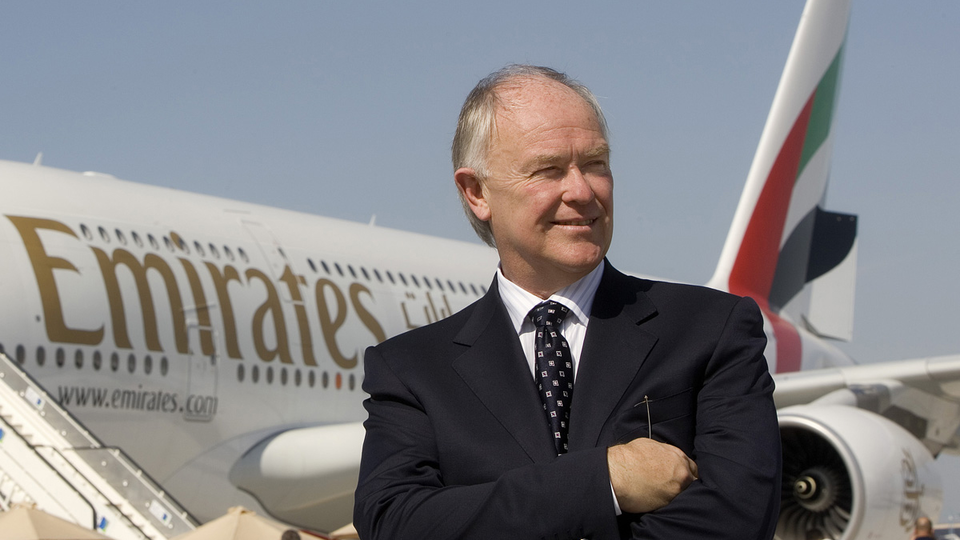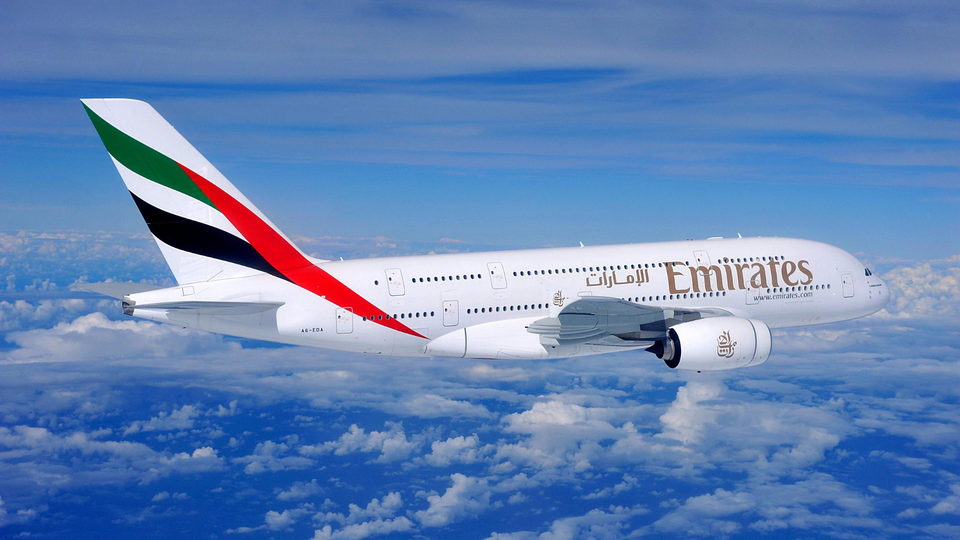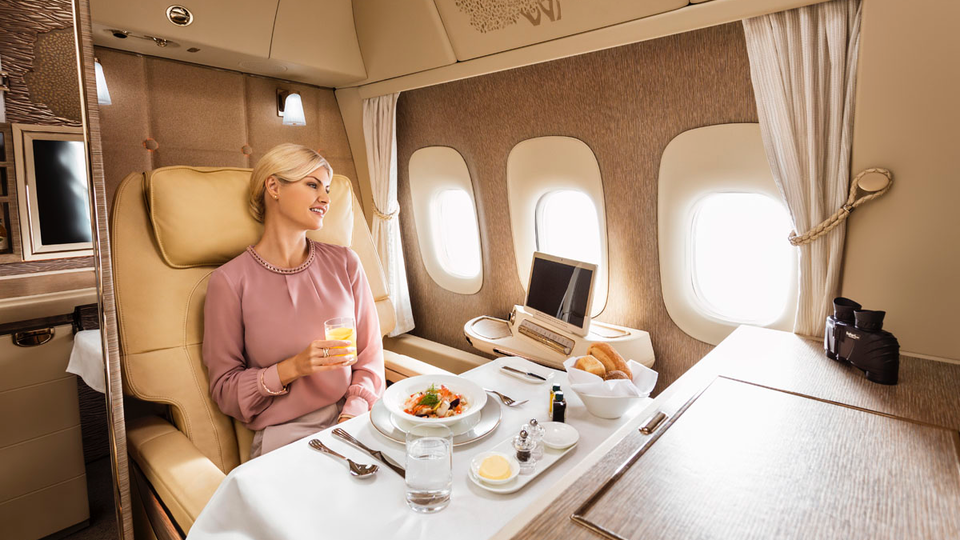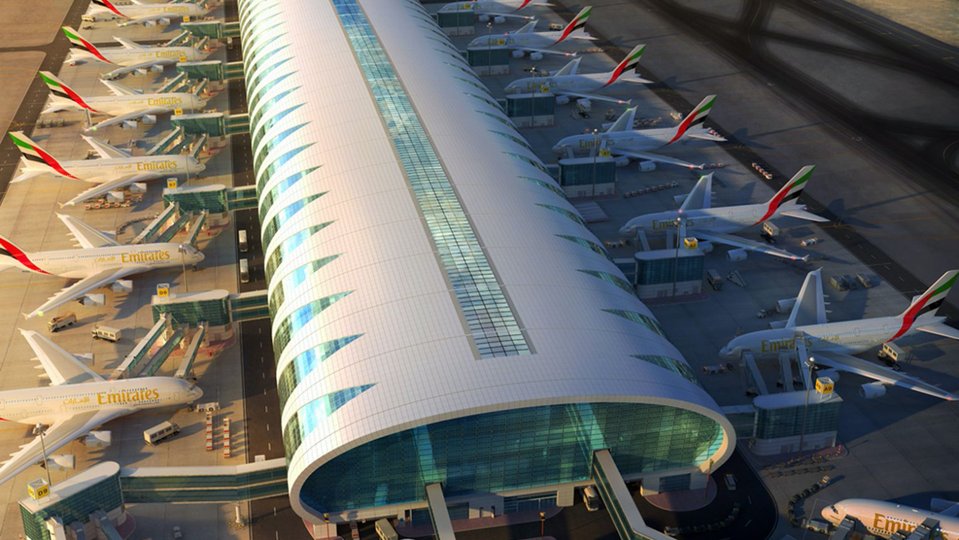Facing challenges before the outbreak, Emirates' golden years are gone
All airlines will struggle with the impact of the coronavirus, but Emirates had some serious weaknesses going in.

Emirates is grounded, and global aviation with it. Much as Pan Am was an emblem of the first wave of global aviation, Emirates has dominated the world airline industry for a generation. The suspension of all passenger flights marks the death knell of that era.
The Dubai-based carrier is the largest airline by international passenger traffic, with the capacity to move its customers 391 billion seat-kilometers last year. In terms of cross-border traffic, that’s twice the capacity of any U.S. airline and about a seventh more than the three European carriers that are its closest international competitors in terms of scale.
The shutdown of that vast network is a hammer-blow not just for the industry but for people around the world.
There’s a reason so many airlines are (like Emirates) state-owned, or have special rights and duties to their home countries written into their constitutions. They aren’t just a leisure service: they’re a piece of vital national and international infrastructure that can provide an airlift service in an emergency. But businesses that thrive on bustling cross-border traffic are inevitably going to struggle in current conditions.
Cathay Pacific – another carrier that, like Emirates, has no domestic aviation market – is cutting 96% of capacity in April and May, which is as close as you can get to shutting down, while Qantas is ending international flights altogether.
We’ve seen something like this before. Pan Am went bankrupt amid the collapse in air travel that accompanied the 1991 Gulf War; its competitor Trans World Airlines entered the first of many Chapter 11 processes around the same time.
Another wave of bankruptcies and rescue takeovers followed after the September 11 attacks, and again after the 2008 financial crisis. More than a decade on from that, we’re probably overdue for another shakeout.
That certainly looks like what we’re going to get. “Most airlines in the world” will be bankrupt by the end of May at current rates of cash burn, according to consultants CAPA Centre for Aviation. The industry needs about US$200 billion in bailout money if it’s to survive, according to the International Air Transport Association, the largest group representing airlines.
Emirates has some serious weaknesses as it approaches this perfect storm. Dubai’s status as the preeminent hub in the global network of transfer passengers, and its fleet of capacious twin-aisle jets, are as much a product of the recent era of promiscuous globalization as Pan Am’s fleet of gas-guzzling early-model Boeing 747s were a product of the era before the 1973 oil crisis.
On an immediate level, that means it lacks even the meager domestic aviation cashflows that rivals in the U.S., China and elsewhere can fall back on.
In the longer term, there’s the risk that Covid-19 and the Trump-driven trade wars that preceded it raise drawbridges across the world, leaving behind a dark mentality of xenophobia as gates are closed to outsiders. In that grim future, Emirates’ Benetton catalog-tinged vision of a multicultural world shaking hands at Dubai airport looks as outdated as, well, shaking hands.
Even if things return to a semblance of normalcy at some point, Emirates’ golden years are behind it – a fact that neatly coincides with the upcoming retirement of Tim Clark, who led the airline since its inception.
Rivals with bigger domestic markets have already been looking to use longer-haul Airbus A350s and Boeing 787s to skip past hub airports like Dubai altogether. The A320neo and the 737 MAX, should it recover from its current woes, will also bite off pieces of medium-haul traffic with budget carrier-style prices, undermining key routes into Europe and South Asia.

Emirates still has some advantages in facing the coming conflagration. Unlike Etihad and Qatar Airways, it has never reported a loss in financial reports dating back to 1989. That’s a fairly extraordinary result for an airline that’s been around for so long – although there’s still a week still to go on its current financial year.
Most importantly, though, the only shareholders it answers to are Dubai’s ruling Al Maktoum family.
For decades, they’ve regarded the carrier as a crucial element of their oil-poor emirate’s strategy for a long-term economic future. With crude prices currently south of US$30 and Gulf monarchies edging alarmingly close to burning through their own petrocash piles, that bet looks as sound as it’s ever been.
If aviation is about to be crippled by a virus-driven resurgence of nationalism, it’s the carriers most closely bound up with their governments that stand the best chance of survival.



Air New Zealand - Airpoints
08 Aug 2014
Total posts 39
I'm hoping, and praying, that the impending demise of many airlines helps bring about the end of the era of mindless travel - people using cheap fares pushed by airlines to travel for no good or very trivial reasons. It drives down standards right across the board and includes cynical Airline tactics like charging for extras like pillows etc and increasing sardine-like conditions in Economy Class. Remember when air travel was a wonder and a delight and something for it? Let's make flying great again!
Qantas - Qantas Frequent Flyer
29 Mar 2015
Total posts 94
Wby don't you just say it: "let them eat cake"!
Travel broadens the mind. It is has and always will be a good thing.
Business travel that insists on "free" items all paid for by customers and shareholders is probably far more unnecessary than so called "unnecessay" travel.
Air New Zealand - Airpoints
08 Aug 2014
Total posts 39
Why don't you just say: “eat the rich. I'm a full-blown socialist?” Because that's what you sound like. My point is that mindless travel is a symptom of rampant consumerism. It's not good for people's keeping up with the Joneses mentality or good for the planet. I hope that more considered attitudes to travel emerge from this debacle.
Emirates Airlines - Skywards
19 Jan 2018
Total posts 23
As a regular traveler (in J class) on the Emirates A380 - predominantly MEL to NCE return (in fact I was originally due to fly out today!) - I for one would be greatly saddened by the demise of the airline - their offering was (for a long time) far superior to most other airlines, and in many cases still is. And although I'm fully aware that the COVID-19 pandemic has caused (and will continue to cause) an economic disaster of global proportions, I still find it very hard to believe that Emirates won't survive it. Who knows, maybe from the ashes and even greater bird will rise?!
Air New Zealand - Airpoints
21 Jan 2016
Total posts 195
Those airlines who have deep financial pockets or who have friendly governments will survive. The current commercial passenger aviation as we know it now is going to be a shadow of its former self, as the increasing effects of planet warming will disrupt the current reliance on global manufacturing, supply chains, trade, health, travel and economies. COVID-19 is a glimpse to what is to come as the planet continues to warm.
Emirates Airlines - Skywards
20 Jan 2018
Total posts 39
JohnC, I like your optimism, but get a reality check. People will continue to travel for whatever reason if their finances allow.
I travel Emirates exclusively to Africa (Nigeria, Ethiopa and Uganda) visiting and supporting 7 families of people I have rescued from the slavery of prostitution in Dubai, where I worked for well over a decade. You may call my travel reason frivolous, but I see it as essential in helping these families to continue prospering.
We all have our reasons for travelling, and people like you (and me) will always make judgements about what other people do, always in line with our own world view. Get over it, relax! One day, travel by aeroplane will cease when the world wakes up to the magnitude of its effect on the environment. Until then, I'm making the most of it. And so will everyone else. That's why we are in this terrible hole. We only change when forced to do so. Genuine altruism is a rare bird!
Qantas - Qantas Frequent Flyer
05 May 2017
Total posts 13
So long as they keep their frequency, good standard of service i think there will always be a place for airlines like Emirates given their ability to offer one stop connections to many locations in Europe from Australia. I will continue to fly with them ( or Qatar) so long as they continue to partner with Qantas (or Oneworld) and offer multiple daily options.
One World
31 Mar 2020
Total posts 18
JohnC, i echo your words loudly, having to travel the Asian routes often,
i strongly agree, air travel is special, but sometimes it looks like just a
bus ride to somewhere, bring back the joy of air travel as oppose to the
fake money making airlines, pay for seat, pay for meal, pay for toilet
paper, what next, bring your own parachute.
Hi Guest, join in the discussion on Facing challenges before the outbreak, Emirates' golden years are gone